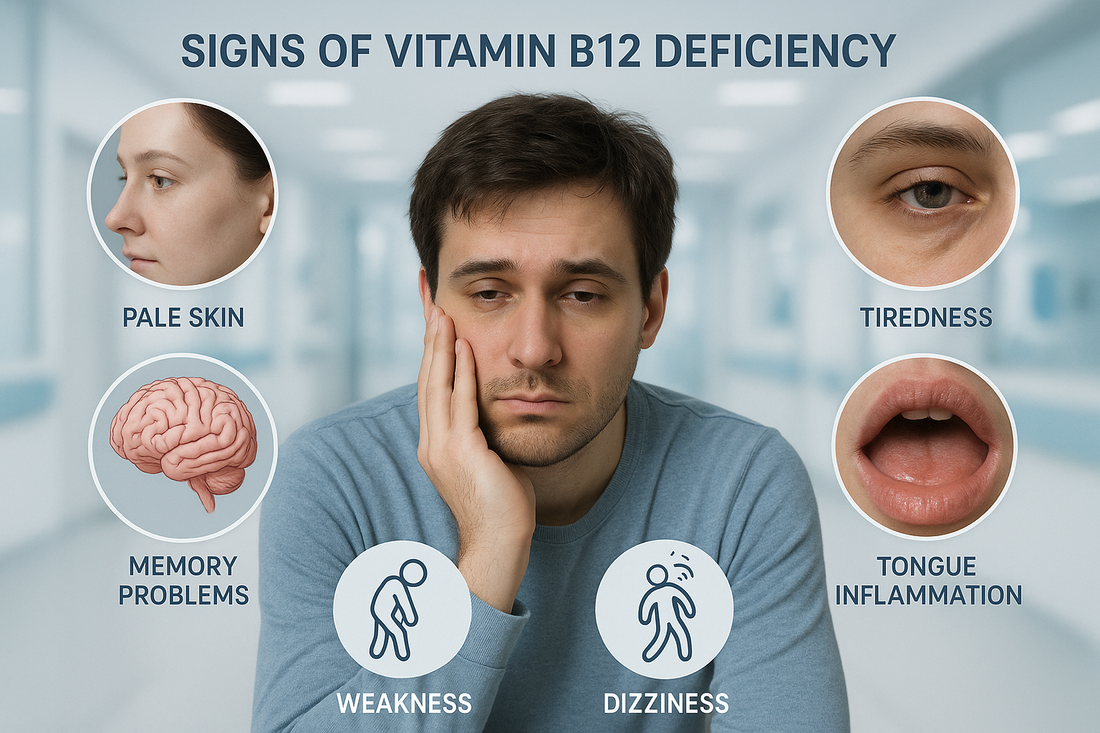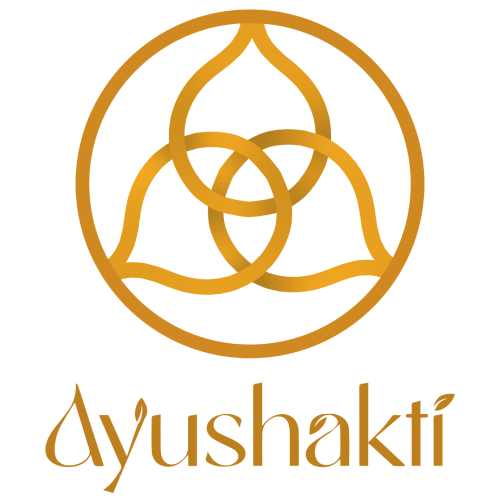
Signs You’re Low on Vitamin B12 and How to Fix It
Share
Vitamin B12, also known as cobalamin, is an essential nutrient that plays a critical role in red blood cell formation, neurological function, and DNA synthesis. Deficiency in B12 can lead to fatigue, cognitive decline, nerve issues, and other long-term health problems.
While modern medical research emphasizes dietary supplementation, Ayurveda provides complementary guidance through natural dietary sources, herbal support, and lifestyle practices to maintain optimal B12 levels. Combining these approaches ensures better absorption, utilization, and overall health.
This article will explain how to recognize a B12 deficiency, its effects, and how to restore optimal levels naturally with a combination of protein-rich foods, Ayurvedic therapies, and mindful nutrition.
What Is Vitamin B12 and Why Is It Important?
Vitamin B12 is water-soluble and found naturally in certain foods. It helps:
- Produce healthy red blood cells to prevent anemia
- Maintain a healthy nervous system and prevent nerve damage
- Support cognitive function and mental clarity
- Assist in energy metabolism by converting food into energy
- Protein Powder can play a supporting role for those who may not get enough B12 from diet alone, especially vegetarians or older adults, as it can be fortified with essential vitamins including B12.
Common Causes of Vitamin B12 Deficiency

Vitamin B12 deficiency can occur due to several factors:
1. Dietary Insufficiency
- Vegans and strict vegetarians may not consume enough animal-based sources of B12.
- Relying heavily on processed foods without fortified protein powders or supplements can increase risk.
2. Malabsorption Issues
- Conditions affecting the stomach and intestines can reduce B12 absorption.
- Ayurveda emphasizes healthy digestive fire (Agni) to maximize nutrient absorption.
3. Age-Related Decline
- Older adults may produce less stomach acid, reducing B12 absorption.
4. Lifestyle Factors
- Chronic stress, alcohol consumption, or poor diet can affect B12 levels and overall metabolism.
Signs and Symptoms of B12 Deficiency
Recognizing deficiency early can prevent long-term complications. Common signs include:
Physical Signs
- Fatigue and weakness
- Pale or yellowish skin
- Shortness of breath and dizziness
- Rapid heartbeat
Neurological Symptoms
- Tingling or numbness in hands and feet
- Balance problems and coordination issues
- Memory loss and difficulty concentrating
Mental and Emotional Symptoms
- Mood swings, irritability, or depression
- Brain fog and lack of clarity
- Difficulty in learning or retaining new information
Digestive Issues
- Loss of appetite
- Nausea or mild diarrhea
- Weak digestion due to low Agni, according to Ayurveda
How Ayurveda Understands Vitamin B12 Deficiency
In Ayurveda, B12 deficiency can be linked to low Agni (digestive fire), poor tissue nourishment (Dhatu depletion), and Vata imbalance. Key considerations include:
- Majja Dhatu (bone marrow and nervous system): Weakness, fatigue, or numbness indicate depletion.
- Rakta Dhatu (blood): Pale skin, anemia, and fatigue show impaired blood quality.
- Ojas (vital energy): Low immunity and chronic fatigue may result from B12 deficiency.
Ayurveda recommends diet, herbal support, and lifestyle practices to restore balance and optimize nutrient absorption naturally.
Natural Dietary Sources of Vitamin B12
While B12 is primarily found in animal-based foods, Ayurveda emphasizes natural, easily digestible, and nourishing sources:
1. Dairy Products
- Milk, yogurt, ghee, and paneer support Majja and Rakta Dhatu.
- Combine with protein powders fortified with natural nutrients for added support.
2. Eggs
- Rich in B12 and high-quality protein to support tissue repair and energy.
3. Fish and Seafood (if included in diet)
- Provide bioavailable B12 for nervous system support.
4. Fortified Plant-Based Protein Powders
- For vegetarians or those with low animal intake, fortified protein powders ensure sufficient B12 intake.
- Combining with Ayurvedic herbs like Ashwagandha or Shatavari enhances absorption and tissue support.
Ayurvedic Herbs and Therapies to Support B12 Absorption
Ayurveda recommends herbs and therapies to improve digestive fire and nutrient absorption, ensuring B12 is efficiently utilized:
1. Triphala
- Supports digestive health and detoxifies the gut.
2. Ashwagandha
- Enhances energy, supports nervous system function, and boosts Ojas.
3. Shatavari
- Nourishes tissues, supports recovery, and balances Vata and Pitta.
4. Guduchi (Tinospora cordifolia)
- Detoxifies and improves immunity, indirectly supporting nutrient metabolism.
5. Abhyanga (Oil Massage)
- Stimulates circulation, supports lymphatic detox, and strengthens nervous system tissues.
How Protein Powder Can Help
Protein powders, especially those fortified with vitamins and minerals, play an important role in B12 support:
- Ensures adequate amino acids for neurotransmitter synthesis
- Enhances blood cell formation and tissue repair
- Supports energy metabolism in combination with B12-rich diet
- When combined with Ayurvedic herbs and warm liquids, absorption and utilization improve significantly
Example: Mix plant-based protein powder with warm milk, a pinch of turmeric, and ground flax seeds for a B12- and omega-rich nutrient drink.
Lifestyle Practices to Improve B12 Levels Naturally
1. Mindful Eating
- Eat warm, freshly cooked meals
- Combine protein-rich foods with digestive spices like cumin, coriander, and fennel
2. Yoga and Pranayama
- Improve circulation, oxygenation, and nervous system function
3. Stress Management
- Chronic stress depletes Ojas and affects nutrient absorption
- Meditation, deep breathing, and restorative yoga improve mental and physical resilience
4. Adequate Sleep
- Essential for tissue repair and nervous system health
5. Avoid Overprocessed Foods
- Minimize packaged, fried, and refined foods that impair digestion and nutrient absorption
How to Restore B12 Levels
1. Dietary Inclusion
- Include milk, yogurt, eggs, or fortified protein powders in daily meals
- Add nuts, seeds, and herbal teas to improve absorption
2. Herbal Support
- Take Ashwagandha, Shatavari, and Triphala under Ayurvedic guidance
- Herbal teas with Brahmi and Guduchi support cognition and energy
3. Ayurvedic Detoxification
- Gentle detox using Triphala or warm water with cumin and ginger enhances nutrient assimilation
4. Combine Protein and Herbs
- Example: Protein shake with plant-based protein powder, flax seeds, turmeric, and Ashwagandha
- Helps restore tissue strength, energy, and cognitive function
Warning Signs to Watch
- Persistent fatigue despite rest
- Tingling or numbness in extremities
- Memory loss or poor concentration
- Pale or yellowish skin
- Digestive irregularities
If these signs persist, Ayurvedic consultation is recommended to restore balance and prevent long-term complications.
For regular health tips & updates visit Ayushakti’s Social Media Pages:
- Facebook – Ayushakti Ayurved | Facebook
- Instagram – Ayushakti Ayurved (@ayushakti)
- Pinterest – ayushaktiayurveda
Get all the updates about Ayushakti Ayurved on WhatsApp directly. Click here to Join our WhatsApp Channel
Ayushakti's mission is to help people in every way possible. Our Ayurvedic experts are available to give you a consultation either over the phone or through a video consultation. We recommend customised diets, home remedies, and detox therapies to help you recover from health problems. Book your consultation now!
If you would like to know the location or visit one of our centres, please click here: https://www.ayushakti.com/home/p/contact
For more information, write to us at info@ayushakti.com or call our toll-free numbers: 18002663001 (India) and +18002800906 (Global).
Blog Author: Dr. Ramchandra Konduskar
Expert Review: Dr Smita Pankaj Naram
Co-Founder, Ayushakti Ayurved Pvt Ltd
Disclaimer: This blog is for educational purposes only. Please consult an Ayurvedic practitioner before trying or consuming any medicines, home remedies or treatments mentioned in this blog. The information provided is not intended to diagnose, treat, cure, or prevent any disease.





